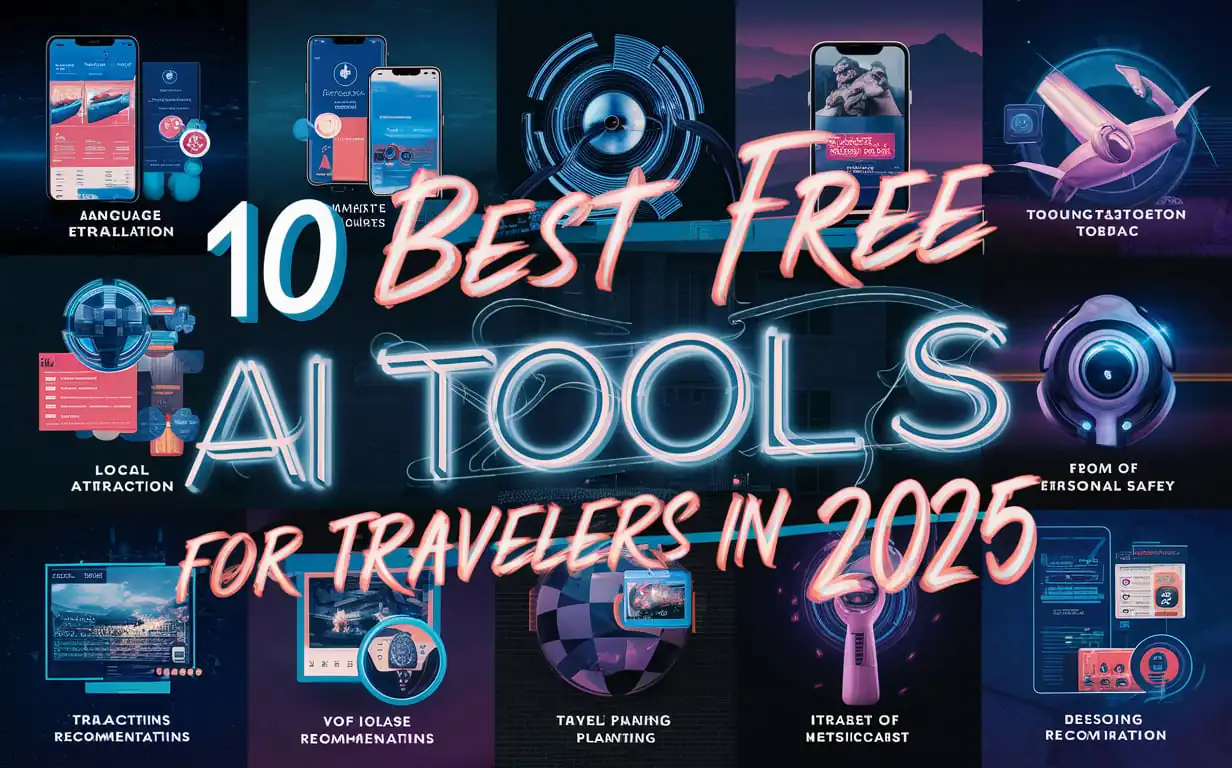
The adventure of travel has changed. Not entirely—getting lost in winding streets, spontaneous detours, chance encounters—they still matter. But in 2025, how we plan for travel? That’s where things feel different. Artificial intelligence hasn’t just entered the scene quietly. It’s rewritten parts of the script. Whether you’re heading on a family vacation, a birthday trip, or squeezing in a business trip between meetings, best free AI tools for travelers now shape our plans in surprisingly personal ways.
So here’s a list. Not definitive. Not perfect. Just ten free AI tools I’ve found useful—or at least interesting—during my own travel experiences. Some will help build detailed travel itineraries. Others? They simply reduce the noise when your brain’s overloaded from planning three different trip details at once.
With travelers now choosing from text to music AI tools, the options for enhancing every aspect of your journey are virtually limitless. As we move through 2025, several free AI tools for travelers stand out for their exceptional capabilities and user-friendly interfaces.
Let’s get into it.
Explore Smarter: 10 Best Free AI Tools for Travelers in 2025

1. Trip Planner AI
This one might already be on your radar. It’s essentially an AI-powered travel planner that offers Personalized travel itineraries based on your travel preferences, budget constraints, and even travel style.
You tell it your upcoming trip’s location, travel dates, and what kind of experience you’re after—slow mornings, food-heavy days, accessible options, that sort of thing—and it creates a surprisingly usable personalized itinerary. It’s not flawless. Sometimes the suggestions lean too touristy. But it’s editable, so you can tweak the route planning or swap out a suggested museum for a quiet park. And that flexibility? That matters.
2. GuideGeek
A bit like texting a travel assistant who’s unusually fast and never sleeps. GuideGeek works via WhatsApp and answers questions on the go. Ask about local transportation, restaurant suggestions, list of attractions near your hotel, or even ask for advice on tipping etiquette in Vietnam—it’s that broad.
It’s become kind of like my quiet companion on solo trips. One time I asked for vegetarian-friendly restaurants in Dubrovnik and got five options in under ten seconds. Not all gems, but one ended up on my must-see attractions list. That’s the thing with these AI tools—they don’t always get it right, but they get you somewhere.
3. Wanderlog
For the control freaks and meticulous planners (which, if we’re being honest, I sometimes become), Wanderlog is a blessing. It’s a collaborative trip planning tool that lets you organize travel tips plans, flights, hotel bookings, and activity booking in one timeline.
It even integrates maps and has this AI feature that suggests changes to your travel itinerary based on weather or opening hours. Collaborative travel planning with friends? This helps avoid that annoying “so what’s the plan today?” group chat.
4. Roam Around
This is one of those newer AI-powered travel planner tools that feels fresh. You enter your destination and select a travel style—adventure travel, laid-back, cultural, budget travel, etc.—and Roam Around spits out an itinerary. Is it perfect? No. But it’s often better than scrolling through 17 listicles of “Top 10 things to do in Rome.”
Think of it as a trip planning app that gives you a loose plan you can either follow—or completely ignore. Like that first draft of a dream vacation. I used it to plan a birthday trip to Edinburgh and ended up discovering this tiny bookstore café that wasn’t on any popular destination guide.
5. Sygic Travel Maps (AI-Enhanced)
Sygic’s evolved beyond just maps. It now includes AI-powered suggestions based on travel time, crowd levels, sustainability impact, and list of sites you might otherwise skip.
Its AI-powered Maps feature adapts based on weather and traffic. I once changed my walking route in Prague based on its real-time suggestion, avoiding a political rally I didn’t even know was happening. Small detail, big comfort.
6. ChatGPT (Custom Travel Use)
Obvious choice? Maybe. But in Travel Mode, ChatGPT becomes more than just a Q&A machine. It’s now able to generate hyper-personalized travel experiences, based on personal preferences, budget constraints, and more.
One user I spoke with said they planned their entire business travel week in Berlin—hotel bookings, public transport hacks, restaurant reservations—using just this. It even made personalized recommendations for quiet coffee spots near co-working spaces.
Sometimes the suggestions feel a bit generic at first, but if you rephrase or dig deeper, you can uncover real gems.
7. AI Translator Earbuds (Timekettle / iFlytek)
Not everyone’s comfortable relying on apps when they’re in the middle of a crowded station in a foreign city. AI-powered translator earbuds offer real-time conversation tools that allow for smoother cross-cultural communication.
It’s especially useful if you’re traveling with travel companions who speak different languages, or if you’re headed somewhere with less mainstream tourist infrastructure. Plus, these tools are becoming increasingly accessible options for travelers with hearing impairments, thanks to voice-to-text updates.
8. Google Lens (AI Upgrades)
Still one of the best AI-powered travel discovery tools, especially in a pinch. Point it at a menu, a monument, even a metro map—it reads, translates, and offers context. It’s not quite a full artificial intelligence travel-planning tool, but it adds on context you often don’t think to search for.
I’ve used it to understand random dishes in Tokyo and—more awkwardly—to avoid accidentally entering restricted buildings in Athens. It doesn’t always get it right. But it helps more than it hurts.
9. Hopper (AI Fare Prediction)
Technically not new, but Hopper’s AI-powered trip planner features have gotten far better in 2025. Besides predicting flight prices, it now factors in booking links, alerts you about alternative train routes, and even makes accommodation suggestions based on your flight arrival times.
It’s part of that growing trend of travel ecommerce brands integrating deeply with your travel planning process. Sometimes that’s helpful. Sometimes it’s too much. But I’ve saved a few hundred dollars because of its predictions, so… mixed feelings, but mostly positive.
10. TravelPerk (for Business Travel)
This one’s tailored toward business travelers. If your road trip plan involves meetings, multiple cities, or complicated airline group booking management, TravelPerk uses business intelligence and AI to streamline the whole process.
It offers personalized travel recommendations for nearby accommodation, dining, or coworking based on your schedule. Also, as an assistant for customer service, it’s surprisingly responsive—often faster than contacting travel agencies.
It’s ideal for people who don’t have time for “inspiration”—just results. And that’s okay too.
Final Thoughts
There’s no one-size-fits-all tool here. Honestly, I don’t think there should be. Travel is too personal, too nuanced. Some people want popular itineraries, others prefer alternative destinations and long meandering afternoons.
These AI-powered tools won’t replace the advice of travel agents, or that feeling of flipping through a guidebook with a coffee. But they can reduce stress, save time, and even introduce you to experiences you might never have found otherwise.
The travel industry is changing. Travelers want more control, more customization, more personal touch. The tools listed above—many still evolving—represent that shift. They aren’t magic. But they’re a step toward more actionable travel experiences, and in a way, more meaningful ones too.
Just…don’t let them plan everything. Leave a little room for surprise.






